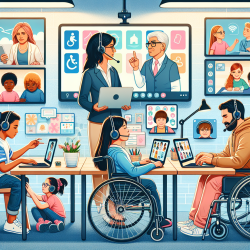In the realm of mental health services, understanding cultural nuances is crucial for effective practice. The research article "Latinos’ Conceptualization of Depression, Diabetes, and Mental Health–Related Stigma" sheds light on how these conditions are perceived within Latino communities. This blog will explore how practitioners can leverage these insights to enhance their skills and better serve this population.
The Study's Core Findings
The study conducted in Houston, TX, involved 469 Latino participants who were surveyed using an experimental vignette methodology. The findings revealed that while 60% of participants could identify symptoms of depression, identifying co-occurring symptoms of diabetes was more challenging. Public stigma towards individuals with depression was moderate, and the presence of diabetes did not significantly alter these perceptions.
Implications for Practitioners
- Health Literacy: The study highlights a critical need for improved health literacy regarding depression and diabetes within Latino communities. Practitioners should focus on educational interventions that enhance awareness and understanding of these conditions.
- Cultural Competence: Understanding cultural values such as familismo (family loyalty) and machismo (traditional male roles) is essential. These values can influence help-seeking behaviors and perceptions of mental illness.
- Stigma Reduction: Practitioners should work towards reducing stigma by fostering open discussions about mental health within communities and addressing misconceptions directly.
Strategies for Implementation
To effectively implement the findings from this research, practitioners can consider the following strategies:
- Community Engagement: Collaborate with community leaders and organizations to create culturally relevant educational programs that address both mental and physical health conditions.
- Tailored Communication: Develop communication strategies that resonate with Latino cultural values. This may include using relatable narratives or testimonials from community members who have successfully managed these conditions.
- Culturally Sensitive Interventions: Design interventions that respect cultural traditions while promoting modern healthcare practices. For instance, integrating traditional healing practices with evidence-based treatments could enhance acceptance and adherence.
Encouraging Further Research
This study opens avenues for further research into the intersectionality of cultural identity and health perceptions. Practitioners are encouraged to engage in or support research that explores these dynamics in greater depth to develop more effective interventions.
Conclusion
The insights from "Latinos’ Conceptualization of Depression, Diabetes, and Mental Health–Related Stigma" offer valuable guidance for practitioners aiming to improve their service delivery to Latino communities. By enhancing health literacy, addressing stigma, and implementing culturally competent practices, practitioners can significantly impact the well-being of their patients.
Latinos’ Conceptualization of Depression, Diabetes, and Mental Health–Related Stigma










